The automatic choice
Steel is an automatic choice because of its qualities. Mainly, due to its durability and versatility, steel is the preferred material in the development of structures and infrastructure.
The market
The steel market is diverse, defined by shape, size and type. Based on market developments in the past few years, in the main, the sector can be dissected into the following categories:
- Long steel and flat steel
Long steel is segmented into wire rods, rebars, merchant bars, and heavy sections, among others. Flat steel is subdivided based on product type into hot-rolled wide strips, and quarto plates, among others.
- Type
From a type perspective, the market is segmented into carbon steel, alloy steel, stainless steel, and tool steel. Typically, the composition of steel produced depends upon end-users’ desired applications.
Demand and supply
These steel categories have to be available as and when needed. Typically, companies in downstream industries source locally, where it is available, and import it from other countries. The dominant local steel-producing countries on the continent are Egypt, South Africa, Nigeria, Kenya, Tanzania, Morocco, and Namibia.
Africa Iron & Steel Market Outlook Report 2021-2029, a research review of the state of Africa’s steel market was published recently. Its findings reveal interesting trends.
In local production, there is an increase in specialised steel alloys. Steel alloys are designed to meet the demand for steel with enhanced characteristics.
Another intriguing observation is the extent governments are going to protect local producers from imported steel through legislation. The Department of Trade and Industry in South Africa is a case in point (see sidebar). The DTI has made it a condition for the use of locally-produced materials in projects. This is to facilitate development and employment creation.
However, it is palpable that local production cannot meet the volumes of demand or some of the specifications in projects. From a price perspective, the majority of downstream industry players consider locally-produced steel uncompetitive, as industry body Steel Tube Export Association of South Africa’s (Steasa) Chief Executive Officer, Keitumetse Moumakoe, lamented in a press statement last year. Certainly, imports will continue filling the void in the foreseeable future.
In contrast, in other steel-producing countries, there are no significant restrictions on imports. Presumably, market forces dictate. The downstream industry players in those countries do not have big concerns.
What’s in store for the downstream industry when all is said and done?
Prospects
On the project front, based on the recent developments, prospects for steel producers appear bright. Most countries in sub-Saharan Africa plan to build more plants to meet the increasing electricity demand. Besides, electrification projects are either ongoing or in the pipeline.
To complement this, countries are diversifying their energy mix to accommodate renewable and are constructing solar power plants.
These developments have the potential to sustain steel demand for a while. Fabricators will be involved in producing steel towers for the transmission grid and distribution infrastructure, steel frames used in solar installations and wind turbines and boilers for power plants.
All in all, granted, the future trajectory of the comings and goings in the market for steel cannot be predicted with certainty. Nonetheless, there is one constant: as long as construction projects are ongoing, you can bet your bottom dollar that steel will always be in demand. Imports will ensure supply certainty.
Sidebar
Protecting the local turf
South Africa is never short of intriguing developments in many spheres. These have not spared the steel sector. In a move considered extreme by players in the downstream industry, the country introduced protective tariffs on primary steel hot rolled coil (HRC) and coated steel. Supposedly, this was aimed at curbing the influx of imported steel into the country to protect AMSA, South Africa’s sole domestic steel producer.
However, this hasn’t deterred the inflow of imports. The downstream industry prefers imported HRC steel due to competitive pricing and access to variety. Ludovico Sanges, the managing director of Duferco, one of the players, says his company has been able to compete successfully in the international market using imported HRC steel.
Imported steel accounts for about one-third of the country’s steel consumption, according to a new Steel Report published by the South African Iron and Steel Institute (SAISI). If truth be told, this could be a conservative estimate. Despite being cushioned by tariffs, AMSA has not been able to sustain its operations. The decision to close its plant in Boksburg indicates this. Annual domestic steel production capacity in South Africa is estimated at 6.5 million tonnes. With the reduction of AMSA’s capacity, this is set to plummet. The downstream industry will use more imported steel in its projects.



